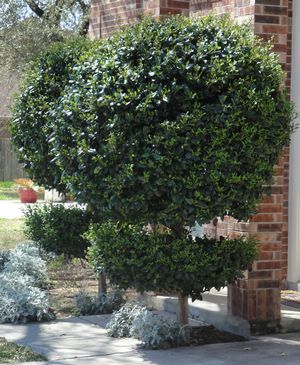Print This Page


Note : Only grows this way naturally when pruned very often.
Ligustrum, Waxleaf
Privit, Japanese
Ligustrum japonicum 'Texanum'
Waxleaf Ligustrum (Ligustrum japonicum), also known as Wax-Leaf Privet, Japanese Privet, or even Japanese Ligustrum (which is a misnomer, more on that below) is a versatile, evergreen shrub or small tree widely used in Texas landscapes for its dense foliage and adaptability. It is often shaped into hedges, privacy screens, or small ornamental trees due to its compact growth and glossy, dark green leaves. In spring, it produces clusters of small, fragrant white flowers, followed by dark berries in fall that attract birds. This hardy plant is popular in residential and commercial landscapes due to its low-maintenance nature and ability to tolerate urban conditions.
Waxleaf Ligustrum thrives in full sun to partial shade and is adaptable to various soil types, though it prefers well-draining, slightly acidic to neutral soils. It can tolerate some drought once established but benefits from occasional deep watering during extended dry periods. The flowers attract pollinators, but the berries are mildly toxic if ingested, making it a less ideal choice for homes with pets or small children. Additionally, the plant is generally deer-resistant, adding to its suitability for Texas landscapes.
Reaching a mature height of 8 to 12 feet with a spread of 6 to 8 feet, Waxleaf Ligustrum is fast-growing and requires occasional pruning to maintain its desired shape. While not considered as invasive as some other privets, it does readily reseed, so periodic removal of unwanted seedlings may be necessary. Its dense growth habit makes it an excellent windbreak or sound barrier in addition to being an effective privacy hedge. To form a hedge, plant them 3 to 4 feet apart.
Waxleaf Ligustrum is often confused with Ligustrum lucidum, with common names of Japanese Ligustrum, Japanese Privet, and Glossy Privet -- but they differ in several key ways. Japanese Ligustrum grows significantly taller, reaching 20 to 30 feet, and is more tree-like, whereas Waxleaf Ligustrum remains more compact and shrubby. Additionally, Japanese Ligustrum has larger, thinner leaves with a more pronounced sheen, while Waxleaf Ligustrum has thicker, more rigid leaves. Both plants produce similar flowers and berries, but Japanese Ligustrum is considered more invasive due to its aggressive reseeding and rapid spread.
In winter, Waxleaf Ligustrum remains evergreen across most of Texas, though it may experience leaf damage in particularly harsh cold snaps, especially in USDA Zone 7 or colder regions. A layer of mulch around the base helps insulate the roots, and covering young plants with frost cloth during extreme cold can prevent damage. If frostbite occurs, prune any affected branches in early spring to encourage new, healthy growth.
 |
Topiary |
 |
Medium Hedge |
 |
Fast Growing |
Flower Color:Pale Yellow
|
 |
Height:8-12 Feet
|
 |
Spread:6-8 Feet
|
 |
Spacing:3-4 feet
|
USDA Hardiness Zone 7b
Available Sizes:
| Item |
Description |
| LIG-WAX-05 |
#005 LIGUSTRUM, WAXLEAF |

|
| LIG-WAX-15 |
#015 LIGUSTRUM, WAXLEAF |

|
| LIG-WAX-30 |
#030 LIGUSTRUM, WAXLEAF |

|
Characteristics & Attributes
|
Deer Tolerance
|
Exposure
| • |
Full Sun |
| • |
Full Sun to Part Shade |
|
Habit
|
Soil pH Preference
|
|
Water Needs
|
Tolerates Poor Drainage
|
Toxic to Pets
|







